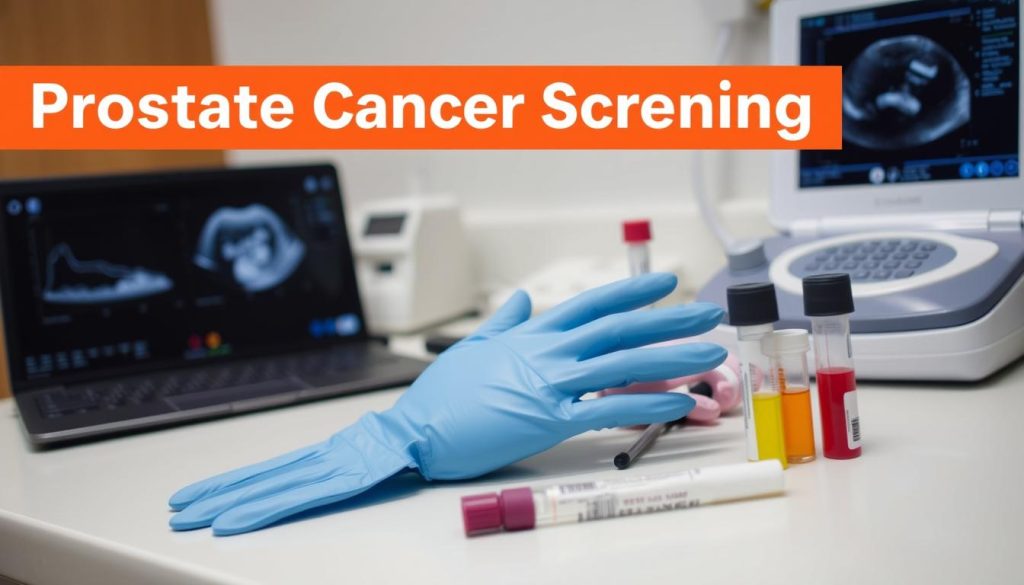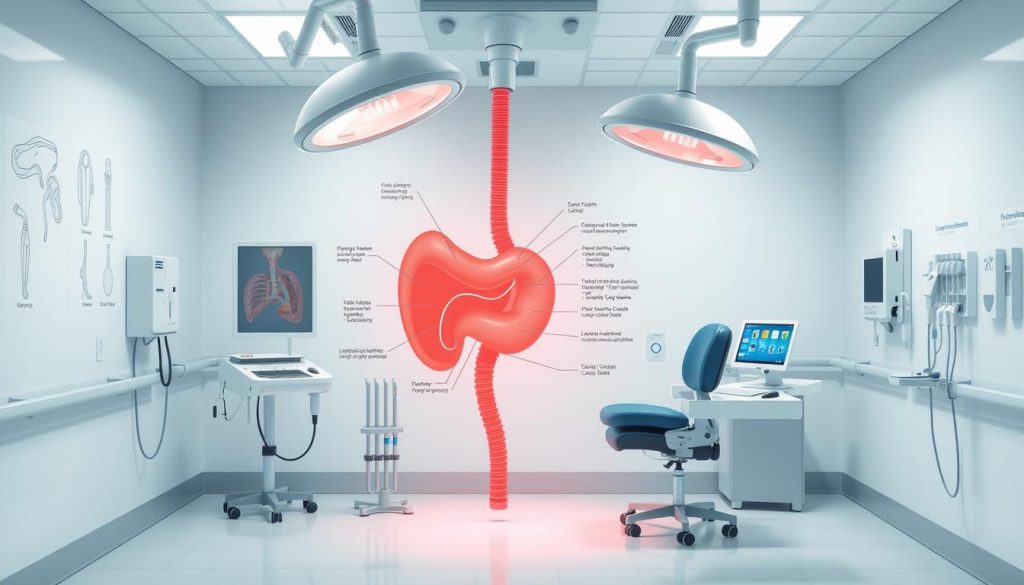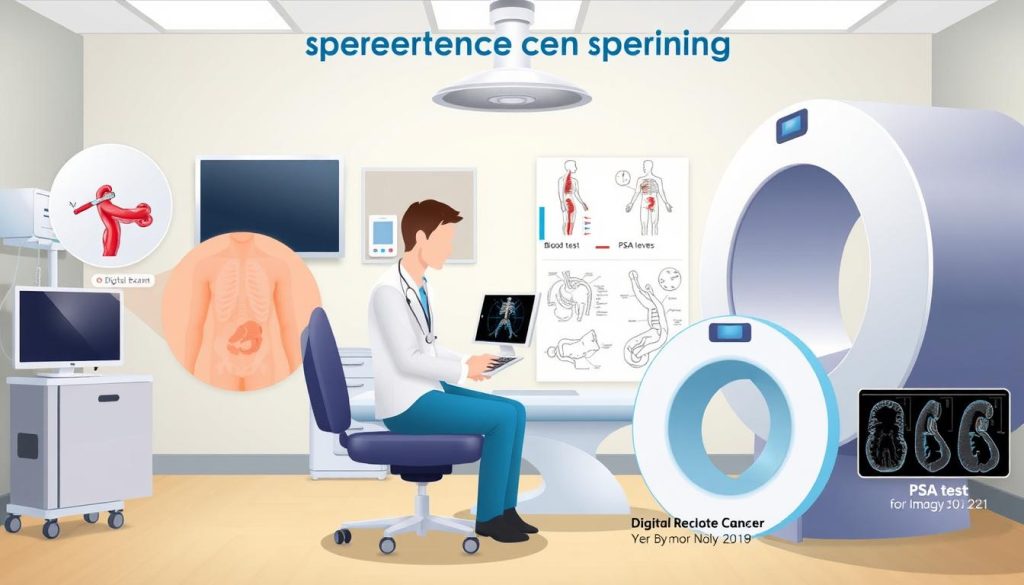Prostate cancer screening is key for men’s health. Knowing how to check for this disease can greatly improve treatment outcomes. Early detection often leads to better treatment results and a better quality of life.
Regular prostate exams are vital to catch issues early. These exams use different methods, like blood tests and imaging. Understanding these helps men take charge of their health and make smart screening choices.
Learning about prostate cancer detection is crucial. It covers everything from basic screening to risk factors. This knowledge is a powerful tool in the fight against prostate cancer. Just as early detection is key for colon, it’s equally important for prostate health.
Understanding Prostate Cancer Screening Basics
Prostate cancer screening is key in the battle against this common male cancer. It uses tests to find cancer early, before symptoms show. This gives men a better shot at successful treatment. Let’s look at the basics of prostate cancer screening and why it matters.
What Is Prostate Cancer Screening
Prostate cancer screening includes two main tests: the PSA blood test and the DRE. These tests help doctors find prostate cancer in men without symptoms. Finding cancer early through screening can lead to better treatment options.
When to Start Regular Screening
Most doctors say men should talk about screening with their doctors around age 50. But, men at higher risk, like African Americans or those with a family history, might start earlier, around 45.
The Importance of Early Detection
Early detection of prostate cancer is very important for several reasons:
- It increases the chances of successful treatment
- It may lead to less aggressive treatment options
- It can significantly improve survival rates
Regular screening catches prostate cancer early, when it’s most treatable. By knowing how to check for prostate cancer and following screening guidelines, men can protect their health.
Common Methods: How Do You Check for Prostate Cancer
Prostate exams are key in finding cancer early. There are two main ways to check: the prostate-specific antigen (PSA) test and the digital rectal exam (DRE). Together, they give a full picture of prostate health.

The PSA test looks at a protein in the blood made by the prostate gland. High levels of PSA might mean prostate, but other things can raise it too. This blood test is usually the first step in checking for prostate cancer.
The digital rectal exam lets a doctor feel the prostate gland through the rectum. This hands-on check can find any unusual sizes, shapes, or textures that could mean cancer.
“Regular prostate exams are essential for men’s health. They can detect issues early, leading to better outcomes.”
Both tests have their good points and downsides. Using them together makes finding prostate cancer more accurate. Here’s how they compare:
| Screening Method | Advantages | Limitations |
|---|---|---|
| PSA Test | Non-invasive, Gives exact numbers | Can be raised by non-cancerous issues |
| Digital Rectal Exam | Finds physical changes, Affordable | May miss small tumors, Depends on doctor’s touch |
It’s key to remember that these tests don’t say for sure if you have cancer. If something unusual shows up, more tests will be needed. Regular check-ups can greatly increase the chance of finding and treating prostate cancer early.
The Prostate-Specific Antigen (PSA) Test Explained
The prostate-specific antigen (PSA) test is key in finding prostate cancer. It’s a blood test that checks for PSA, a protein from the prostate gland. Knowing about PSA levels and how they change can help men stay healthy.
Normal vs. Elevated PSA Levels
PSA levels are measured in nanograms per milliliter (ng/mL) of blood. Doctors use certain guidelines to judge PSA levels:
| Age Range | Normal PSA Level (ng/mL) | Potentially Elevated PSA Level (ng/mL) |
|---|---|---|
| 40-49 years | 0-2.5 | >2.5 |
| 50-59 years | 0-3.5 | >3.5 |
| 60-69 years | 0-4.5 | >4.5 |
| 70+ years | 0-6.5 | >6.5 |
Factors Affecting PSA Results
Many things can change PSA levels, including:
- Age: PSA levels go up as you get older
- Prostate size: Bigger prostates make more PSA
- Medications: Some drugs can change PSA production
- Recent ejaculation: Can briefly raise PSA levels
- Prostate inflammation or infection: Can cause PSA spikes
Frequency of PSA Testing
How often to get a PSA test depends on your risk and past results. Generally, men should talk to their doctor about:
- Starting at age 50 for average-risk men
- Starting at age 45 for high-risk men (African American or family history)
- Every 1-2 years, based on your initial PSA level
Remember, the PSA test is just one part of prostate cancer screening. Your doctor will look at your health and risk factors when deciding what to do next.
Digital Rectal Examination (DRE) Process and Guidelines
The digital rectal exam is a key part of how you check for prostate cancer. It lets doctors find problems in the prostate gland.

During a DRE, a doctor puts a gloved, lubricated finger into the rectum. They feel the prostate to check its size, texture, and for any unusual lumps. The whole exam takes about 30 seconds. It might feel uncomfortable, but it shouldn’t hurt.
“Regular prostate exams are key to early detection and better treatment outcomes.”
Doctors say doing DRE with PSA testing is best for screening. How often you need these exams depends on your age and risk factors. Here’s a basic guide:
| Age Group | Recommended Frequency | Risk Level |
|---|---|---|
| 40-49 | Every 2-3 years | High risk |
| 50-69 | Annually | Average risk |
| 70+ | As advised by doctor | Varies |
Early detection through regular exams greatly improves treatment success. Talk to your doctor about when you should get screened.
Risk Factors and Warning Signs
Understanding the risk factors for prostate cancer and knowing the symptoms can help catch it early. This can lead to better treatment results. Let’s look at the main risk factors and symptoms to watch for.
Age and Family History Considerations
Men’s risk of prostate cancer goes up with age. If your family has a history of it, your risk is higher. Having a father or brother with prostate cancer can double your risk.
Lifestyle and Environmental Factors
Some lifestyle choices can raise your risk of prostate cancer. Eating a lot of red meat and not enough fruits and veggies can be a risk. Not exercising and being overweight also increase your risk. Exposure to certain chemicals might play a role as well.
Common Symptoms to Watch For
Early prostate cancer often doesn’t show symptoms. But, more advanced cases might. Here are some symptoms to watch for:
- Difficulty urinating or weak urine flow
- Blood in urine or semen
- Erectile dysfunction
- Pain in the hips, back, or chest
- Weakness or numbness in legs or feet
Keep in mind, these symptoms can also mean other health issues. If you notice any, see your doctor for a check-up.
| Risk Factor | Impact on Prostate Cancer Risk |
|---|---|
| Age (65+) | Significantly increased |
| Family History | 2-3 times higher risk |
| African American Ethnicity | Higher risk and more aggressive forms |
| High-Fat Diet | Moderately increased risk |
| Obesity | Higher risk of aggressive cancer |
Advanced Diagnostic Procedures
When standard tests show concerns, doctors might suggest more detailed tests. These help confirm or rule out prostate cancer. They guide treatment plans.
Prostate Biopsy Process
A prostate biopsy is a key step in finding prostate cancer. Small tissue samples are taken from the prostate gland. These samples are then checked under a microscope for cancer cells.
The process might sound scary, but it’s usually quick. It’s done with local anesthesia to make it comfortable.
MRI and Imaging Tests
Magnetic Resonance Imaging (MRI) is key in finding prostate cancer. It gives detailed images of the prostate. Doctors use these images to spot any suspicious areas.
Other tests like CT scans or bone scans might also be used. They help see if cancer has spread. These tests are important for effective prostate cancer detection.
Genomic Testing Options
Genomic testing is a new tool against advanced prostate cancer. It looks at the genetic makeup of cancer cells. This helps doctors predict how aggressive the cancer might be.
This information helps guide treatment choices. It makes care more personalized. As research continues, genomic testing might become a standard part of prostate cancer care.
FAQ
Q: What is prostate cancer screening?
A: Prostate cancer screening is a way to find cancer early. It uses the PSA blood test and the digital rectal exam (DRE). These tests help find problems early, making treatment more likely to work.
Q: When should I start regular prostate cancer screening?
A: Most men should start screening at 50. But, if you have a family history or are African American, start at 40-45. Talk to your doctor to find the right time for you.
Q: What is a PSA test?
A: A PSA test is a blood test that checks for prostate-specific antigen. High levels might mean cancer, but other things can cause it too. It’s a key tool for finding cancer early.
Q: What happens during a digital rectal exam (DRE)?
A: A DRE involves a doctor feeling your prostate gland through your rectum. They look for any unusual sizes or textures that could mean cancer. It might be a bit uncomfortable, but it’s quick and important for your health.
Q: What are the risk factors for prostate cancer?
A: Risk factors include age over 50, family history, being African American, and certain genetic mutations. Diet, obesity, and chemicals can also play a part. Knowing your risks helps plan your screenings.
Q: What symptoms should I watch for regarding prostate cancer?
A: Look out for trouble urinating, weak urine, blood in urine or semen, and erectile issues. Pain in the hips, back, or chest is also a sign. But, early cancer often has no symptoms, so regular checks are key.
Q: What is a prostate biopsy?
A: A prostate biopsy removes small tissue samples for cancer checks. It’s suggested for high PSA levels or DRE findings. The procedure uses a thin needle guided by ultrasound.
Q: How often should I get a PSA test?
A: PSA test frequency varies based on age, risk, and past results. Men 50-70 might test every 1-2 years. Your doctor may suggest more tests if you’re at higher risk or have had high PSA levels.
Q: Are there any new technologies for detecting prostate cancer?
A: Yes, new tech like multiparametric MRI and genomic testing are coming. They offer detailed images and genetic insights. These can help with early detection and accurate diagnosis.
Q: Can lifestyle changes reduce my risk of prostate cancer?
A: Some risk factors can’t be changed, but a healthy lifestyle helps. Eat well, stay active, keep a healthy weight, and avoid smoking. Regular check-ups and talking to your doctor are also important for your prostate health.


















